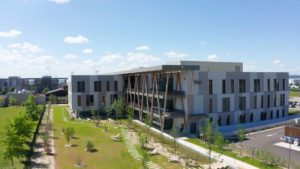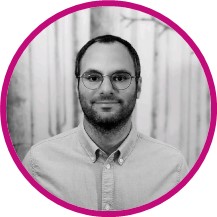HVDC-VSC System
Training
About
Introduction
Supported by ambitious climate objectives, HVDC-VSC technology is playing an increasingly important role in current and future energy transmission systems. VSC technology is crucial in its contribution to the energy transition as it provides new opportunities for more and more interconnected energy markets. However, the technology is developing rapidly, and the complexity of these projects requires detailed engineering expertise. Therefore, the objective of the 5-day training course is to introduce the participants to the principles and challenges of HVDC-VSC technology and to present basic methodologies and technical hands-on experience for VSC projects.
Topics Covered
The training course, organized in close collaboration with RTE and RTE international, covers the following topics:
- Introduction to VSC-MMC technology
- Modelling and simulation of HVDC-VSC systems with EMTP
- Control and protection of VSC-MMC stations
- Introduction to DC cable technology
- Specifications of HVDC-VSC projects
- Maintenance of HVDC converters
Intended Audience
This course is intended for engineers, researchers, operators, and maintenance personnel who work or are planning to work on HVDC projects and would like to gain a deeper understanding of the technology. It provides up-to-date technical expertise on HVDC-VSC projects. This course is also an opportunity to meet and share with experts and colleagues who work in the HVDC field. Thank you for understanding that the number of participants will be limited.
Training Course Structure
The duration of the training course is 5 days (Mon-Fri). The training starts at 9:00 am and ends at 5:00 pm every day (except on Friday). Lunch breaks are planned from noon to 1:00 pm, the cost of which are included in the course fees.
A group dinner for participants and trainers is planned for Thursday. Training presentations and supporting materials will be provided.
Licenses
Temporary EMTP licenses will be provided to the audience. EMTP will be used to illustrate models and concepts and evaluate the performances of HVDC-VSC systems.
Procedure
Date
18 to 22 march 2024
Duration
5 days
Fees
3 850 € (pre-payment)
Discount for students and academia upon request
Conditions
Conditions and terms of RTE international apply. Number of participants from each company limited to ensure a diverse group of participants.
Type of training
Classroom training. A training certificate will be provided at the end of the course for all attendees.
Location
RTE Campus Transfo, Jonage, Lyon (2119 Av. Henri Schneider, 69330 Jonage, France)

The training takes place in the new premises of our real-time HVDC and FACTS laboratory within the RTE CampusTransfo, Europe’s largest campus dedicated to training and innovation in power transmission.
Learn more about the laboratory
Register here
We collect this data in order to answer your questions or any other request for information about our various service offers.
We may also use this data for prospecting purposes, in particular to inform you about our services and our news. You may object to this by mentioning it in your message.
Trainers

Markus Vor dem Berge
Director of Power Electronics and Studies
Markus Vor dem Berge is the director of the Power Electronics and Studies service line. He joined RTE international in 2020.
Markus previously worked at Siemens AG as a system design engineer on HVDC PLUS technology. In particular, he led the works on several HVDC VSC projects as sub-project manager in Europe. He was also the technical project manager for VSC Bipole 2000 MW, ±525 kV for onshore and offshore applications.
Markus has a Master’s in electrical engineering, electronics and communication technology and energy engineering from Aachen University.

Sébastien Dennetière
HVDC Expert & Technical Senior Advisor at RTE international
In January 2010, he joined the French TSO RTE (Réseau de Transport d’Electricité) where he is currently involved in power system simulation and HVDC projects as a technical expert. One of his main tasks is to integrate HVDC/FACTS equipment to the French grid. He oversees the technical coordination of studies performed for HVDC integration in France and abroad. He was responsible for the development of detailed HVDC and wind turbines models in Uruguay and in the development of specifications for coordination of the 2 HVDC systems in Norway for the project “Equinor Johan Sverdrup VSC multivendor interoperability”.
From 2004 to 2008 he worked at the research center of EDF in the field of insulation coordination and power system simulations. From 2002 to 2004 he worked at IREQ (Hydro-Québec) on research and development activities related to the simulation and analysis of electromagnetic transients.
Sébastien Dennetière graduated from the École Supérieure d’Electricité (Supélec) France in 2002. He received his M.Sc. degree and PhD degree from the École Polytechnique de Montréal in 2003 and 2017, respectively.

Pierre Rault
HVDC Expert at RTE international
He is a Power System Expert Engineer in RTE international since 2018, working mainly for the EQUINOR Johan Sverdrup project. In this position, he is involved in the coordination control philosophy of the two HVDCs links of the project. He follows replica installation and commissioning. In addition, he performs and analyses parallel tests with control replicas.
At the same time, he is the secretary of CIGRE WG B4.70: “Guide for Electromagnetic Transient Studies involving VSC converters” and member of CIGRE B4-58: “Control Methodologies For Direct Voltage And Power Flow In A Meshed HVDC Grid”. Furthermore, he is the French representant in the committees TC8 / TC22 / TC115, where he follows and reviews new standards related to VSC-HVDC. Similarly, he is a member of TC115 – WG15 – Functional Specifications for HVDC Grid Systems.
Pierre Rault has been studying and dealing with with HVDC topics since his PhD on Multiterminal VSC-HVDC grid control strategies. Beforehand, he worked at GIE IDEA (EDF/Schneider Electric/G2Lab) on wind farm connection. He was in charge of the necessary requirements and thus reviewed grid codes compliance criteria. Moreover, he developed a methodology for wind farm reactive power management.
Pierre Rault has good proficiency in English. He holds a PhD from Ecole Centrale de Lille, France and a Master’s degree from the Institut National Polytechnique de Grenoble, France.

Hani Saad
Senior HVDC Expert at RTE international
Thanks to his extensive experience on HVDC matters, he is member of several Cigré working groups on HVDC, such as “Application guide for the insulation coordination of Voltage Source Converter HVDC (VSC HVDC) stations” and “AC Fault response options for VSC HVDC Converters”. He has contributed and published several articles on power electronics and power delivery, notably in the Wiley IEEE book. He gave conference related HVDC field and EMT-type tool and is a regular reviewer for IEEE Transactions of Power Delivery, Industrial Electronics.

Marco Schudel
Power Electronics Engineer
Marco Schudel is a power electronics engineer with a wide range of experience in the electricity sector, mainly focused on technical coordination and project management. Currently employed at RTE Réseau de Transport d’Electricité for ten years, Marco holds the position of power electronics project engineer. His responsibilities include the technical coordination of experts for HVDC converter stations, participation in procurement processes, including bid analysis, evaluation and technical negotiation. He has also carried out real-time and off-line electromagnetic transient studies and participated in some commissioning stages.
Marco also worked formerly on market design and modelling, as well as load flow studies, which gives him a systemic view of the grid and its assets.
With a strong background in technical coordination, project management and modelling, Marco brings valuable expertise as a trainer, providing participants with an in-depth insight into the technical challenges and best practices in power electronics and energy project management.

Samy Akkari
HVDC expert at RTE
He is now the Asset Manager for RTE HVDC links at the National Center for Grid Expertise. He also works on the Operation & Maintenance of the INELFE link (2x1GW VSC-MMC, Siemens) and IFA2 link (1GW VSC-CTL, ABB). Finally, he is involved in the Technical Specification of future HVDC projects such as Biscay Bay and CELTIC.
Preliminary
Day 1 – Introduction and HVDC Technology Basics
9.00 – 12.00
- Introduction Session: RTEi, training overview, expertise RTE
- Overview of HVDC technology – evolution, key drivers and challenges
- HVDC MMC station main equipment description
- Q&A
12.00 – 13.00 : Lunch break
13.00 – 17.00
- HVDC connection requirements overview & HVDC System applications 6. Basics of Power Electronics in EMT – Introduction to EMTP
- Q&A
Day 2 – Project management and specification of HVDC projects
9.00 – 12.00
- Basic Design approach
- Tender Principles
- Technical Specifications
- Q&A
12.00 – 13.00 : Lunch break
13.00 – 17.00
- Game
- Project Execution
- Q&A
Day 3 – HVDC converter design, introduction to C&P aspects and EMT studies
9.00 – 12.00
- Introduction to HV cable technology
- Cable systems in HVDC projects
- Qualification and testing
- Installation, Operation and maintenance, monitoring
- HVDC converter design principles
- Q&A
12.00 – 13.00 : Lunch break
13.00 – 17.00
- Introduction to HVDC control and architecture
- General description of VSC controls
- Specific upper-level and low-level controls for MMC converters
- Description of Grid Connected and Grid Forming control
- Excursus: Practical experience of HVDC studies to improve power oscillation in the network
- Q&A
Day 4 – HVDC-VSC design studies and Control and Protection aspects
9.00 – 12.00
- HVDC system design studies
- General overview of converter protection strategy and implementation in real systems
- HVDC-VSC behaviour during AC fault events (balanced and unbalanced conditions)
- DC side transients analysis of typical DC faults: pole-to-ground and one-phase- to-ground faults
- Q&A
12.00 – 13.00 : Lunch break
13.00 – 17.00
- Introduction to transients during start-up and shut-down sequences
- EMT studies for the design and operation HVDC system
- Q&A
Evening: Group dinner in Lyon
Day 5 – Maintenance of HVDC-VSC systems and integration in AC grids and final Q&A session
9.00 – 12.00
- Introduction to the maintenance principles of HVDC-VSC systems
- O&M Team Structure, Roles and Responsibilities, and Required Infrastructure, Facilities and Systems to Support O&M Activities
- Maintenance of HVDC-VSC converter stations, focus on HVDC specifics: Power electronics, auxiliary systems (cooling, climate) and controls
12.00 – 13.00 : Lunch break
13.00 – (before) 15:00
- Maintenance specifications, spare parts
- Maintenance experiences and recommendations
- Introduction to practical experience using replica
- Real Time Simulation Studies Introduction
- Closing / Feedback / Q&A
Backup: Depending on the progress of the course throughout the previous days, individual topics can be picked up and continued during the afternoon session
Register here
We collect this data in order to answer your questions or any other request for information about our various service offers.
We may also use this data for prospecting purposes, in particular to inform you about our services and our news. You may object to this by mentioning it in your message.
